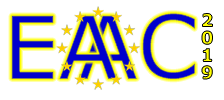Speaker
Description
We performed experiments with the Petawatt beam of the Dresden laser acceleration source Draco to investigate the feasibility of controlled volumetric tumour irradiations with laser-accelerated protons. Therefore, a beamline of two pulsed solenoid magnets was implemented to efficiently capture and shape the beam, which was then analysed by a comprehensive suite of detectors (ionization chamber, scintillator, radiochromic film, etc.).
We present studies how to manipulate and match lateral and depth dose profiles to the desired application and target. These were assisted by benchmark experiments at a conventional accelerator to further characterize the ion-optical properties of the solenoids and to investigate potential distortions of the transported proton beam.
With the characterized beamline first proof-of-principle irradiation studies of volumetric normal and tumour tissue samples have been performed successfully. To advance to full scale irradiation experiments, a higher mean dose rate is necessary to deliver high absolute dose values via multiple bunches (dose control) in short times (~min). Current limitations are the low repetition rate of the beamline and its long cooldown times. Therefore, we developed a novel, actively cooled pulsed solenoid, to be implemented in the beamline, enabling complex irradiation studies with high repetition rates and consequently high mean dose rates.

